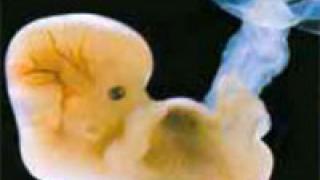New rules allow human tissue to be taken for human-animal embryo experiments without donors' consent, warn leading ethicists

Huge amount of samples of human tissue will be offered for use in controversial human/animal hybrid embryo research without the consent of the patients who donated them, ethics campaigners have warned.
Dr Calum MacKellar, Director of Research at the Scottish Council on Human Bioethics, and Professor David Jones, Director of the Centre for Bioethics and Emerging Technologies at St Mary's University College, London, have raised concerns that people donating cells for research do not realise it is legal for them to be used to create hybrid embryos.
Writing their comment in The Lancet, they said that the Human Fertilisation and Embryology Act 2008, which comes into force this October, created serious difficulties for biobanks in the United Kingdom. The Act, they say, allows, in certain conditions, human tissue to be used for somatic cell nuclear transfers (hSCNT) with both human and non-human ova even though the tissue donor has not specifically consented to this procedure. Thus, each biobank in the United Kingdom now has to decide how to respond to questions from donors and the general public about whether they can use their stored tissue in this way.
Dr MacKellar said: ‘It should not be possible to create certain ethically sensitive animal-human cloned embryos without obtaining explicit consent from the human cell donors.’
‘Many thousands of altruistic individuals, whose leftover tissue was kept after surgery or who gave cells or tissue in the past to biomedical collections for research, would now be aghast if they realised [the material] could now be cloned using animal eggs,’ he added.
(See The Daily Telegraph report)
Professor Jones said that donors may not be aware of what is happening to the donated tissue. He said:
'People may well have ticked a box about medical research in hospital at some point in the past while they were undergoing tests and not even recall it now.
'That tissue could be used to clone an embryo, and you would not even be told it was happening.’
The comment warns of a risk of a public outcry similar to those over scandals at Alder Hey, when the number of harvested organs was over 2,000, and the number of children involved was more than 850, and Bristol Royal Infirmary hospitals, when children's body parts were kept without parental consent on the assumption that this would be acceptable to the parents.
Joyce Robins, a journalist and co-director of pressure group Patient Concern, which promotes choice and empowerment for health service users, warned that most people had ‘not an inkling’ that fundamental changes were about to be introduced.
Ms Robins said:
‘This is absolutely frightening. People who have donated for medical research may well not agree with human/animal hybrids, which are one of the most controversial ideas out there.
‘Scientists know how hard it would be to get consent for these kinds of experiments – this is an attempt to get around the obstacles.’
Jim McManus, from the Catholic Bishops Conference of England and Wales, expressed his alarm and described the law as setting 'the most dangerous precedent’. He said:
‘Whether or not you object to your personal DNA being mixed with animal matter, the ethical consequences of this are so great that express consent should be obtained on every occasion, with no exceptions. I am really alarmed about this.’
The comment of the ethicists compares UK Biobank, one of the largest tissue banks in the country, unfavourably with Generation Scotland, a library of biological samples and information on health and lifestyle from volunteer donors in Scotland, on the issue of using tissue without explicit consent to create embryos.
They conclude:
‘The decision of Generation Scotland does not rule out the use of its stored tissues for hSCNT, but does reassure present and future donors that their tissue will not be used for this purpose without their express consent. In this way the biobank ensures that the public continues to support the important research it facilitates.
‘The approach exemplified by Generation Scotland is not only a safer option for biobanks. Their approach also represents best ethical practice. Indeed, the importance of informed consent has recently been reiterated in US President Barak Obama’s new National Institute of Health Guidelines for Human Stem Cell Research. The principle of explicit and informed consent is the very foundation for any research involving human participants and requiring public support.’
A spokesman for the Human Fertilisation and Embryology Authority tried to alleviate fears saying that the circumstances under which researchers wished to create hybrid embryos were ‘very specific’ and the likelihood of doing so without explicit consent ‘very small’.
Media links
